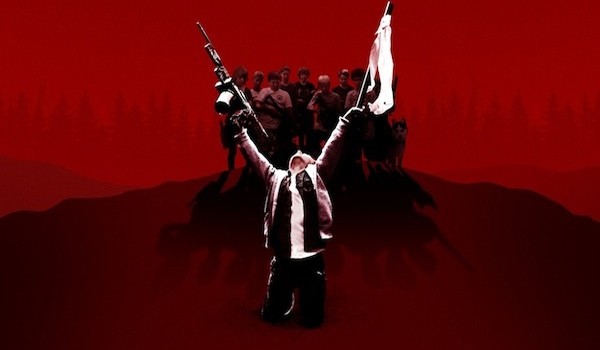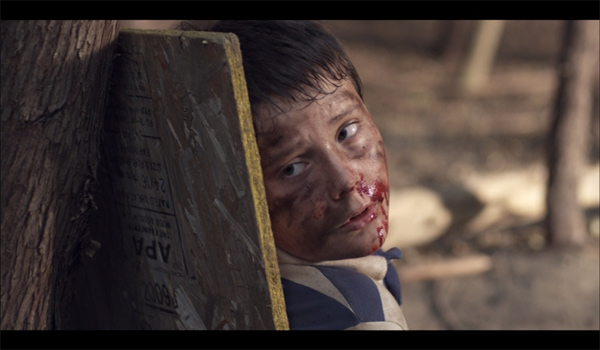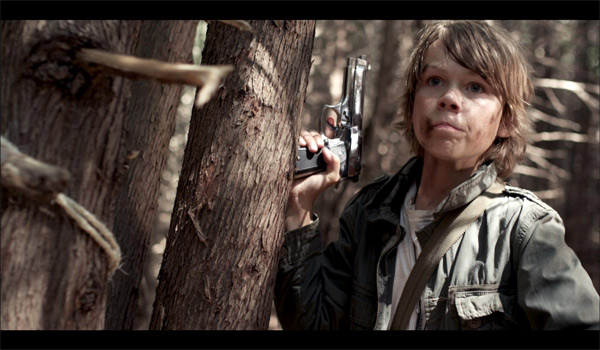There’s a lot to be said about the media and its effect on children. From mainstream news coverage to pop culture/entertainment, children will find a way to incorporate and digest what they hear and see into their lives. I did it when I was younger, my friends did it, and I’m sure you reading this have all done it. This isn’t a discussion on censorship, but an acknowledgement on the effect media has on children. I Declare War frames an imaginative game of War as a way to comment on the dangers of the aforementioned negative media effects on children, overactive imaginations, and the hyperbolic drama that pubescent boys face at such a pivotal age.
I Declare War
Directors:Â Jason Lapeyre & Robert Wilson
Rating: NR
Release Date: July 26 (VOD), August 30 (Limited Theaters)
Two groups of 13-year-old boys venture out to a forest to play War, a game of capture-the-flag driven by imagination where “guns” are just sticks or plastic pop guns, “grenades” are paint-filled balloons, and a set of rules that are both firm and fair at the same time. One team is led by PK Sullivan (Gage Munroe), a war and tactics-obsessed young boy who has never lost a game of War before. On his team are his best friend, Kwon (Siam Yu), a young boy with full faith in PK; Caleb (Kolton Stewart), a mysterious mute; Joker (Spencer Howes), a typical sex-obsessed pre-teen; and Altar Boy (Andy Reid), a newcomer to both the game and the group of friends who has a noted love for Jesus. Opposite of PK are Skinner (Michael Friend), a bit of a crazed rogue who takes command from Quinn (Aidan Gouveia), PK’s first true challenge; Sikorski (Dyson Fyke), a mild-mannered kid, and his “best friend” Frost (Alex Cardilo); and Jess (Mackenzie Munro), the only girl in the game.
The rules of the game are simple: kids that are pretend shot are “paralyzed” until a 10-count where they can either be “revived” by a teammate or “killed” by being hit with a grenade. The game ends when a team’s flag is captured and brought back to its base. The film portrays the children carrying real guns, rarely pulling the wool away from our eyes to show that they are, in fact, either toy guns, slingshots, or twigs. It’s a creative touch explored by directors Jason Lapeyre and Robert Wilson, but it offers up a few moral problems.
The seriousness in which PK takes the game sometimes crosses the line. The Patton-obsessed strategist would do whatever it takes to win the game, even sacrificing his best friend. I Declare War sometimes straddles the line between imagination and reality uncomfortably, mostly in the scenes between Skinner and Kwon. Skinner keeps Kwon hostage as a bargaining chip against PK, but begins to torture him by various means. There’s a cinematic/narrative problem in these scenes where it’s not made clear whether Kwon is actually being hurt (outside of the bloody rope burns on his wrists), or acting as part of the game. This problem also transcends the narrative and addresses the direction itself where the acting isn’t made clear whether it is Yu acting as Kwon acting hurt, or Yu acting as hurt. In a way, this dichotomy stretches out across the film’s entirety through the aforementioned displaying of real guns, which fits in those scenes, but is painfully uncomfortable in the torture scenes.
These scenes exist because each character plays into a stereotype (PK as the war-obsessed strategist, Skinner as the evil paranoid antagonist, etc.) that, for better or worse, drives the narrative’s conflict forward. Everyone gets a minor arc or, at the very least, a character progression that is fulfilled by the end of the film. However, what’s more important and interesting to me is how the kids respond within the confines of the game. As they wander around the forest carrying bazookas and automatic rifles, they talk about the excitement video games bring them and the confusion/fulfillment that comes with having their first crush.
This duality further blurred the narrative’s scope and exactly what Lapeyre and Wilson wanted to convey with I Declare War. It’s a minor comment on children’s imaginations and how they can sometimes be taken too far, but also poses a question on what effect the media has on them. PK is alluded to watching nothing but Patton whenever Kwon visits, references various war tactics over the past century, and definitely possesses a strategist’s mind; to what effect is that influenced by the constant war coverage we’ve been inundated to over the past decade? It’s never addressed, and this might just be my natural over-analysis of the film, but it adds a relevant layer to the film to ponder.
The concept of imagination with reality and the problems that arise from that conflict is what originally attracted me to the film. Did I enjoy it? Yes, but not as much as I expected to. I Declare War is fun at times, uncomfortable at others, but credit is due for creating a self-contained film that doesn’t rely on too much context outside of what’s displayed during its runtime. The film isn’t a coming-of-age film, but a look at the trials and tribulations of various friendships misshaped and destroyed in the name of War.
Score: 6.5 out of 10



